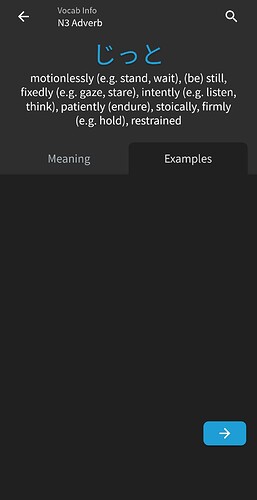わくわく! 
The explanation and then the categorization within sound significance is awesome. I had only seen tiny bits of information alluding to this before, so this is amazing and very helpful to see it presented this way.
Actually, it makes me miss Ashers ‘deep dive’ posts about word etymology or the way various words with the same sound/reading are connected through a unifying concept. As a scientist (with ADHD) these detailed explanations were really helpful in breaking through understanding when I continually struggle with SRS.
There is a fairly good (but short) discussion of this topic in the front section of A Dictionary of Basic Japanese Grammar, if you are interested in further reading.
This is a little bit down the track, but we may end up putting something like very short one sentence descriptions on a lot of the individual onomatopoeia words, so that the meanings and differences become really clear. For example in the ま chapter we have -
Sound significance. ま - Small but packed full.
But then on individual words we could further add.
ニマニマ - Very tighty compacted grin, usually with eyes closed. Compared to ニコニコ which is more broad but relaxed.
This could help to push home the concepts for people. Regardless though, it is an interesting topic, and is something that will need to wait for a rainy day 
Excellent work!
I don’t want to open a massive can of worms but have you considered adding notes for onomatopoeia that have a different nuance depending on the intonation (pitch accent)? E.g., つるつる.
Onomatopoeia are one of those weird things where if you have an intermediate or higher “language sense” then they basically almost always make perfect sense when hearing or seeing them in context but they’re all extremely hard to produce naturally, without thought, when speaking, barring the most common ones.
Tangential but I once saw a mime act where they acted out a ten minute long love story but only said onomatopoeia (and did mime…). As a Japanese learner it was extremely interesting and made some of the sound symbolism stick a bit more in my head.
There are lots of things we could do with onomatopoeia that can potentially make the learning process easier, it’s just a matter of prioritizing them.
Like for a big family of them, they’re just from kanji, so learning the verb they come from can make them a lot easier to remember, especially when there are patterns within those words too like the めく suffix creating verbs out of きらめく, つやめく, ひらめく, ゆらめく, ときめくetc etc etc. You can kinda go ‘oh, basically all めく verbs are just onomatopoeia that come from some specific kanji meaning’.  Then you have to decide whether that information is worth teaching, or better left in a thick ‘unlock onomatopoeia’ textbook
Then you have to decide whether that information is worth teaching, or better left in a thick ‘unlock onomatopoeia’ textbook  .
.
If you write it then I’ll read it! But, yeah, definitely more textbook or research paper territory…
The bane of my existence, yay!
Kidding, this is very helpful
Amem
This is an incredible idea 
Thank yo for your hard work
Just in time actually 
Was super confused at the beach scene in FF VII REBIRTH when Aerith said “ひりひりでひゅうひゅうだね” during the beach scene
English translation in-game doesn’t really tell anything close to what she’s trying to convey
This has definitely plagued me for the entirety of my Japanese education, so to see that you guys have made a deck for it is a major relief
Thank you for this deck! Awesome 
I didn’t even know that things like きっと and こっそり were onomatopoeia. Another great addition, thank you.
Thank you so so so so much!
Thank you guys! I am looking forward to learn more onomatope.
Hey, great idea.
Is this new deck fully available in the app?
I’m using the latest Android version (0.4.1) but the example sentences aren’t showing.
Also can’t find it in the app yet - but really looking forward to this, thank you! 

OKAAAYYY, I’ll finally try vocab on Bunpro 

